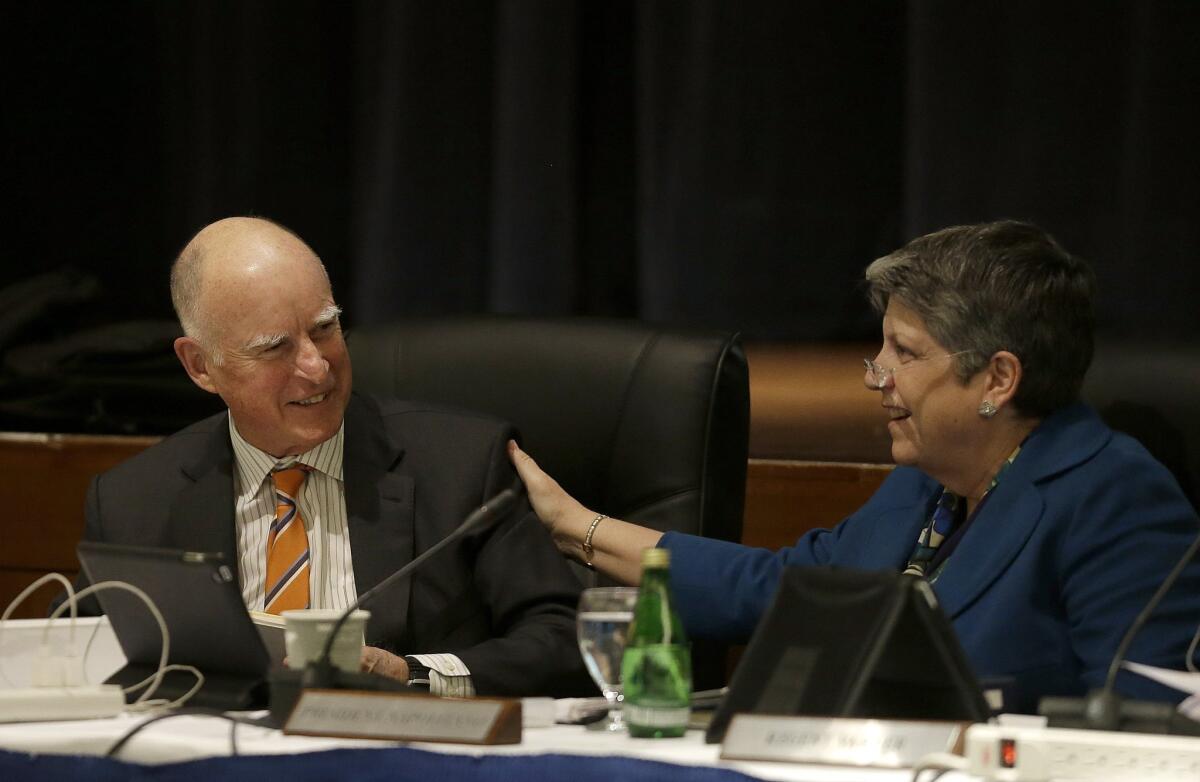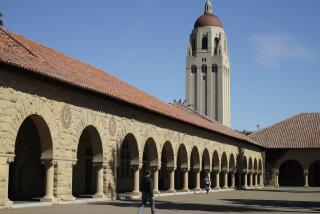No UC tuition hikes for Californians as Brown offers more funds

Gov.
California students at the University of California are getting a two-year reprieve from threatened tuition increases as a result of a large infusion of new state funds to the 10-campus university system in Gov. Jerry Brown’s proposed spending plan, UC officials and Brown said.
The two-year freeze on tuition for state residents is the highlight of an agreement between Brown and UC President Janet Napolitano after months of negotiations and lobbying to avoid what UC said might have been hikes as high as 5% in each of the next five years. In-state students now pay about $12,200 a year for basic systemwide tuition and fees, not including room and board and some campus charges; that figure is triple what it was in 2002.
However, out-of-state students – whose rising numbers have irked legislators and California families – are expected to face 5% tuition increases to about $36,900 next year, and further hikes in later years, officials said. And graduate students from California and elsewhere in some professional programs such as medicine and business administration will see increases that vary by campuses and discipline.
Starting in the 2017-18 school year and the next, UC tuition for Californians will rise again, in a formula that will involve the general inflation rate but will be capped at 5% annually, according to the plan.
“I think we’ve reached a very good agreement from the perspective of the university and for California,” Napolitano said in an interview. The pact, she said, will produce “a tremendous period of predictable tuition for California residents and will provide the additional financial resources we so sorely needed.”
Brown said that his proposal to pay $436 million of UC’s pension debts over the next three years will “stabilize their finances going forward” and that the agreement to freeze tuition for another two years “is very good indeed.”
During a morning news conference in Sacramento, he also detailed UC’s promises in the agreement to raise the number of transfer students by making the process of moving from community colleges easier and more “transparent” and to cap pension benefits for future employees.
Among other steps, he said, will be a study on why costs of similar courses vary widely among UC campuses and how efficiencies can be brought to them.
Later, his aides said that UC also has agreed to expand its online course offerings and to develop pathways for students to earn degrees in three years in popular majors at each campus, with a goal that 5% of students will take advantage of that by summer 2017.
Clearly, the state’s much improved fiscal situation helped break the deadlock between two veteran politicians: Brown, who is in his fourth term, and Napolitano, who had been Arizona governor and U.S. secretary of Homeland Security before coming to the 238,400-student UC system in 2013. Student protests against the now-abandoned tuition increases are likely to be replaced by celebrations if the deal holds up through reviews by the Legislature and the UC board of regents.
Previously Brown had proposed a 4% increase, or about $119 million, in state funding to UC next year but only if UC maintained the current tuition freeze into a fourth year. He has long criticized what he considers high administrative salaries and light teaching loads for some faculty.
In the agreement, UC promises to tackle some of Brown’s other causes, including bolstering summer school offerings, getting rid of overly complicated requirements that slow students’ paths to graduation and considering ways to offer more online alternatives in high-demand courses, Napolitano said.
Brown, who is a UC regent, and Napolitano formed an unusual two-person committee in January to privately examine UC’s spending and revenues. Their meetings seemed to calm the two sides and move them away from confrontation. In January, the two were “very far apart and have come a very long way,” Napolitano said.
Under the agreement outlined Thursday, UC officials said the system will receive 4% increases in state funding in each of the next four years, for a cumulative total of $507 million. Plus, in the sweetener that sealed the deal, UC is expected to receive a total of $436 million over three years from the state’s rainy day surplus to help pay its pension obligations; in exchange, UC will work on further changes in its retirement plans that likely will put a cap on or reduce some potential benefits for new hires.
That extra money, in addition to about $50 million for deferred maintenance and energy efficiency projects, surpassed UC’s position that it needed an extra $100 million. As a result, Napolitano said, campuses will be able to add course offerings and hire more faculty.
The plan faces some likely changes as it goes through the state Legislature over coming weeks.
Left unsettled so far is whether the number of California undergraduates will be increased. Napolitano said in March that enrollment for in-state students would not grow without more state funds devoted to it, and Brown’s plan does not specifically set aside money for that increase.
Also, Napolitano previously said the ranks of undergraduates from other states and nations would not rise any further at UC Berkeley and UCLA, where their share of current freshmen is about 30%. UC leaders say the extra $23,000 those nonresidents pay on top of basic tuition helps keep the university afloat and that they are not displacing Californians. Brown’s budget proposal does not specify any systemwide levels although some legislators have expressed interest in wider and more restrictive caps.
Under the previous plan approved by the regents in November, UC tuition could have increased by as much as $612 in 2015-16, to $12,804, and gone up to as high as $15,564 in 2019-20. That triggered protests on campuses and at the regents’ meetings. UC officials last fall complained that the $2.64 billion in state general revenue funds for UC this year is $460 million below what it was seven years ago.
Follow me on Twitter @larrygordonlat.
More to Read
Start your day right
Sign up for Essential California for news, features and recommendations from the L.A. Times and beyond in your inbox six days a week.
You may occasionally receive promotional content from the Los Angeles Times.







